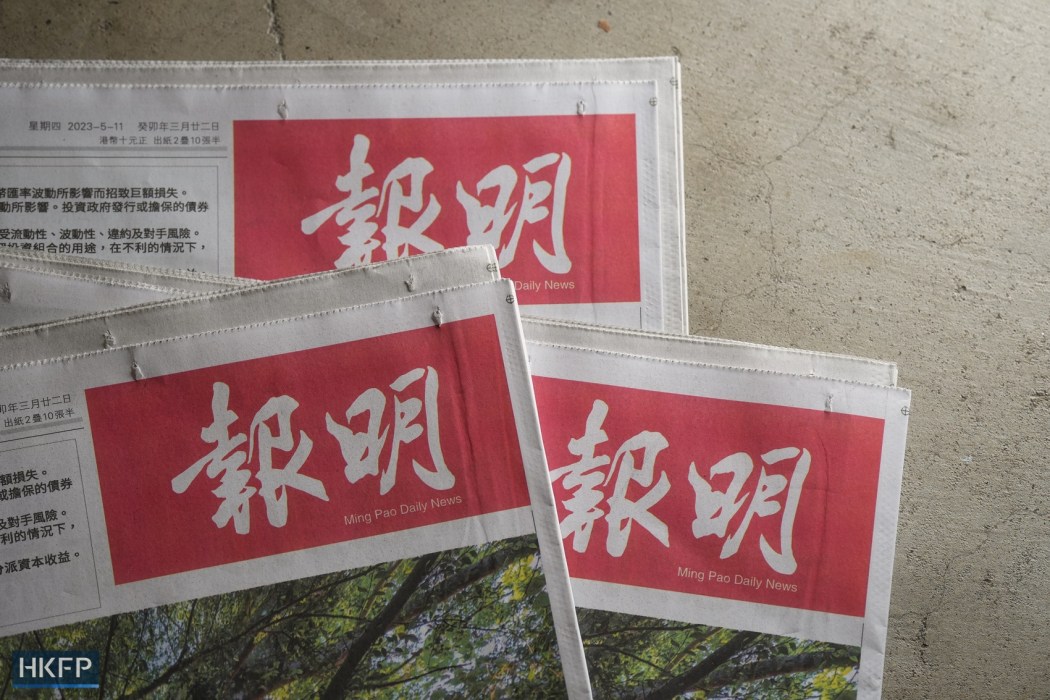Hong Kong’s security minister has hit back at a local press group after it said the suspension of a long-standing political cartoon strip following repeated government complaints showed that the city “could not tolerate critical voices.”

The decision by local Chinese newspaper Ming Pao to axe a comic strip by prominent political cartoonist “Zunzi” Wong Kei-kwan showed that the room for free speech in Hong Kong had “narrowed further,“ the Hong Kong Journalists Association (HKJA) said in a statement released on Thursday.
The remarks came hours after the mainstream newspaper announced that they would stop publishing Wong’s work, which often included satire on current events and government policies, this Sunday. The editorial team thanked the cartoonist for “witnessing the transformation of the era” with them over the past 40 years, but did not give any reasons for the suspension.
Wong’s comic strip has been openly criticised by government officials six times since October last year, according to Ming Pao and HKJA. One of the earliest complaints claimed the cartoonist “seriously deviated from the truth” with his drawing about the city’s talent attraction efforts. The illustration concerned showed an advertisement on a bulletin board stating “urgently seeks world-class talent,” adding that those who were “accepting of strict governance” would be prioritised.
The government took aim at Wong again on Tuesday after he mocked the small-circle government committees that are set to hold District Council seats under a proposed overhaul of the city’s local-level administration. The cartoon “ignores facts, deceives the public and is discriminatory,” Secretary for Home and Youth Affairs Alice Mak claimed.

Such complaints against the political cartoonist and the suspension of his comic strip could intensify self-censorship in Hong Kong, the HKJA said on Thursday. Media organisations may become worried that their content would face severe criticism or be accused of breaching the law.
“Backed by abundant resources and public power, the SAR government repeatedly targeted a mere [cartoonist], reflecting the that Hong Kong cannot tolerate critical voices,” the press group wrote.
See also: Explainer: The decline of Hong Kong’s press freedom under the national security law
The Ming Pao Staff Association also expressed regret over the comic strip’s suspension, saying they felt “helpless” about the newspaper’s decision. They thanked Wong for contributing political cartoons to Ming Pao since the 1980s, saying he used humour to comment on current affairs and attracted readers’ attention.
“Aside from news reporting, the work of contributors is also part of Ming Pao’s core values. A diverse society should tolerate different voices…” the staff association wrote on Facebook.
Gov’t must ‘speak up’
Secretary for Security Chris Tang on Thursday was asked if the lines relating to satirical political cartoons were becoming “blurrier” in light of the suspension of Wong’s comic. He said the government was willing to accept criticism, but such comments must be “based on the truth.”

He also lashed out at the HKJA’s statement, saying the government must “speak up” if someone used the media as a platform for airing “misleading accusations” against the authorities.
“You can’t use misleading accusations to incite citizens to vilify the government…” the minister told the press at an event for showing support for the proposed revamp of district administration.
“The government must speak up, clarify and condemn… and give the citizens the right to know,” he added.
Press freedom in Hong Kong has come under the spotlight since Beijing passed a national security law in June 2020 in response to large-scale protests and unrest that began in the summer of 2019.
The city ranked 140th among the 180 regions in the latest press freedom index by Reporters Without Borders released last week, trailing behind Colombia and Cameroon. China ranked 179th, just above North Korea.
Support HKFP | Policies & Ethics | Error/typo? | Contact Us | Newsletter | Transparency & Annual Report | Apps
Help safeguard press freedom & keep HKFP free for all readers by supporting our team

HKFP has an impartial stance, transparent funding, and balanced coverage guided by an Ethics Code and Corrections Policy.
Support press freedom & help us surpass 1,000 monthly Patrons: 100% independent, governed by an ethics code & not-for-profit.
Support HKFP | Policies & Ethics | Error/typo? | Contact Us | Newsletter | Transparency & Annual Report | Apps
Help safeguard press freedom & keep HKFP free for all readers by supporting our team

LATEST FROM HKFP
HKFP has an impartial stance, transparent funding, and balanced coverage guided by an Ethics Code and Corrections Policy.
Support press freedom & help us surpass 1,000 monthly Patrons: 100% independent, governed by an ethics code & not-for-profit.














